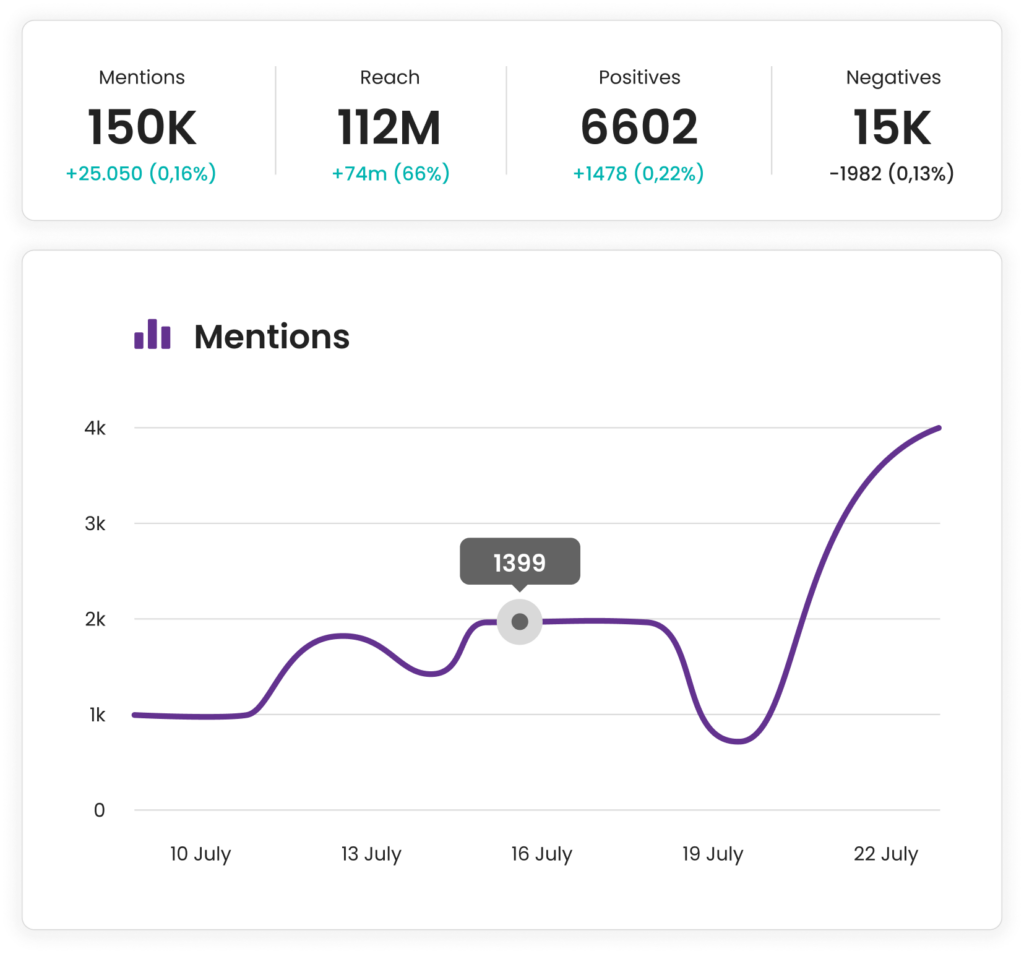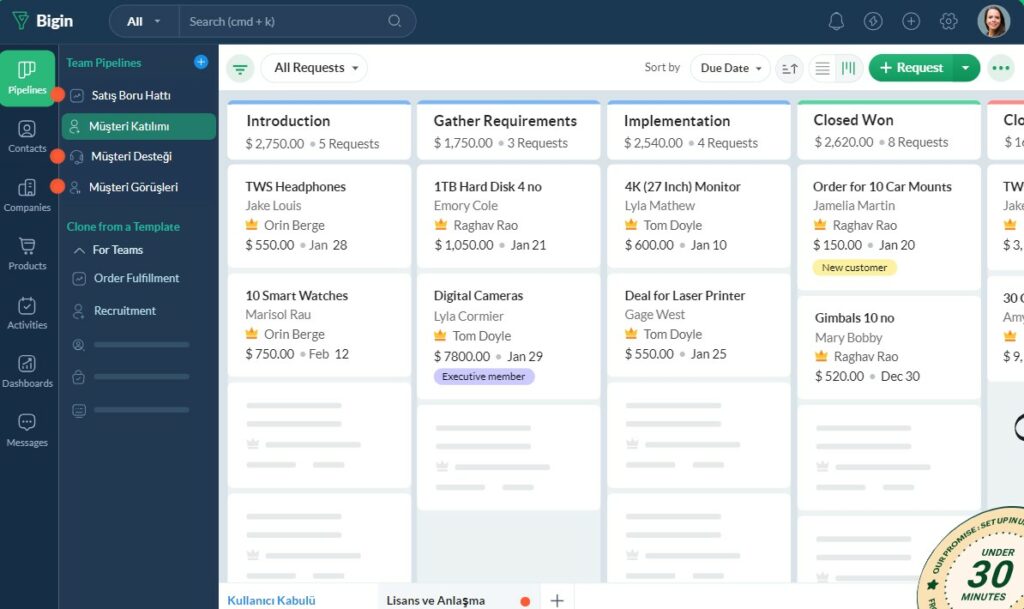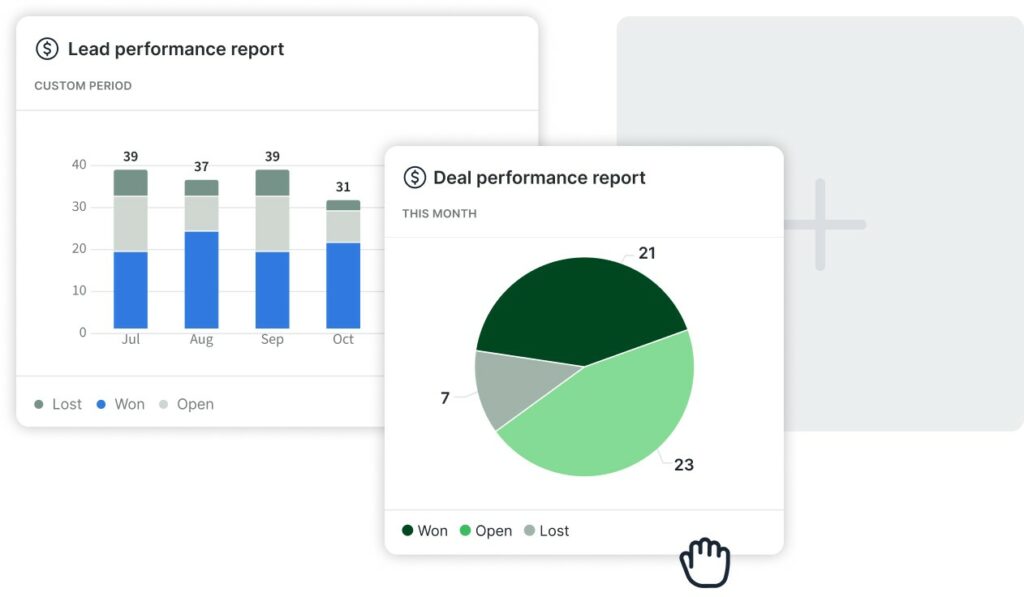5 Best CRM Software for Startups in 2025
- January 7, 2025
In the fast-paced world of startup entrepreneurship, building and maintaining strong relationships with customers is essential for success. As startup companies strive to establish their presence in competitive markets and drive growth, implementing an effective Customer Relationship Management (CRM) system becomes crucial. However, with numerous CRM options available, choosing the right one can be daunting, especially for startups with limited resources.
In this article, we explore five CRM systems that are particularly well-suited for startup companies.

5 Best CRM Software for Startups in 2025
Let’s take a look at the 5 CRM systems you can choose for your startup company.
1. Grispi
Grispi has all the features that startup companies may need to grow their business. You can manage your customer demands from different channels on a single platform with Grispi. Grispi, which offers affordable solutions to startup companies, stores customer data securely. You can also monitor your business performance and develop future strategies with detailed analysis and reporting features. You can contact us to try Grispi free for 14 days.

2. HubSpot CRM
HubSpot CRM is a popular choice among startups due to its user-friendly interface, robust features, and affordability. It offers a comprehensive suite of tools for lead management, contact organization, email tracking, and sales automation, all within a single platform.
HubSpot’s free CRM plan provides essential features to help startups get started without any cost, while its paid plans offer advanced features such as custom reporting, email sequences, and integration with other HubSpot marketing and sales tools.
3. Zoho CRM

Zoho CRM is another excellent option for startup companies seeking a feature-rich yet cost-effective CRM solution. Zoho CRM offers a wide range of functionalities, including lead management, pipeline management, email marketing, and analytics. Its intuitive interface and customizable modules make it easy for startups to tailor the CRM system to their specific needs and workflows.
Zoho CRM also offers flexible pricing plans, including a free version with basic features, making it accessible to startups with limited budgets.
4. Freshsales
Freshsales is a cloud-based CRM software designed to help startups and small businesses streamline their sales processes and drive growth. It offers features such as lead scoring, email tracking, built-in calling feature and AI-powered insights to help sales teams prioritize leads and close deals more effectively. Freshsales’ clean and intuitive interface, along with its affordable pricing plans, makes it an attractive option for startups looking to scale their sales operations without exceeding their budget.
5. Pipedrive
Pipedrive is a highly visual and easy-to-use CRM system that caters to the needs of startup companies, particularly those with a focus on sales. Its visual pipeline interface allows users to track deals and manage sales activities with ease.
Pipedrive offers features such as email integration, goal setting, and reporting, empowering startups to streamline their sales processes and drive revenue growth. With flexible pricing plans and a user-friendly interface, Pipedrive is an excellent choice for startups seeking a straightforward yet powerful CRM solution.

These CRM systems offer a combination of affordability, ease of use, and robust features that make them ideal choices for startup companies looking to effectively manage their customer relationships and drive business growth.
Why Should Startup Companies Use a CRM System?
Startup companies often operate in dynamic and competitive environments where building and maintaining strong customer relationships is paramount to success. Implementing a Customer Relationship Management (CRM) system offers numerous benefits for startups, including:
Centralized Customer Data
A CRM system serves as a centralized repository for storing and managing customer information, interactions, and preferences. This enables startups to gain a comprehensive understanding of their customers’ needs and behaviors, facilitating targeted marketing campaigns and personalized communication.
Improved Efficiency and Productivity
By automating routine tasks such as lead management, email marketing, and sales pipeline tracking, CRM systems streamline workflows and free up valuable time for startup teams to focus on core business activities and strategic initiatives.
Enhanced Collaboration and Communication
CRM systems enable seamless collaboration and communication among team members by providing real-time access to customer data and activity history. This fosters a cohesive and coordinated approach to customer engagement, leading to improved teamwork and better outcomes.
Scalability and Growth Support
As startup companies grow and expand their customer base, CRM systems provide scalable solutions that can accommodate increasing data volumes, users, and business complexity. This scalability ensures that startups can effectively manage growth without outgrowing their CRM platform.
Data-Driven Decision Making
By leveraging analytics and reporting features, CRM systems empower startups to make data-driven decisions based on actionable insights derived from customer interactions, sales trends, and performance metrics. This enables more informed strategic planning and resource allocation.

Overall, implementing a CRM system equips startup companies with the tools and capabilities needed to build strong customer relationships, drive business growth, and compete effectively in their respective markets.
What Features Should We Look for When Choosing a CRM System as a StartUp Company?
When selecting a CRM system for their startup, companies should prioritize features that align with their specific needs, budget constraints, and growth objectives. Key features to consider include:
- Ease of Use: Look for a CRM system with an intuitive interface and user-friendly navigation, ensuring that team members can quickly adopt and make full use of the platform without extensive training.
- Scalability: Choose a CRM system that can scale with your startup as it grows, offering flexible pricing plans and customizable features to accommodate increasing data volumes, users, and business complexity.
- Lead and Contact Management: Ensure that the CRM system provides robust lead and contact management capabilities, allowing you to efficiently capture, track, and nurture leads throughout the sales cycle.
- Sales Pipeline Management: Look for features that enable you to visualize and manage your sales pipeline effectively, tracking opportunities, forecasting revenue, and prioritizing deals to maximize conversion rates.
- Marketing Automation: Consider CRM systems that offer integrated marketing automation tools, enabling you to automate email campaigns, segment your customer base, and track campaign performance to drive engagement and conversions.
- Customer Support: Evaluate the quality and availability of customer support services offered by the CRM vendor, including technical assistance, training resources, and ongoing support channels to ensure a smooth implementation and optimal user experience.
- Integration Capabilities: Choose a CRM system that seamlessly integrates with other essential business applications and tools used by your startup, such as email marketing platforms, project management software, and e-commerce platforms, to streamline workflows and data exchange.
By carefully assessing these features and considering factors such as pricing, customization options, and vendor reputation, startup companies can select a CRM system that meets their current needs and sets the foundation for future growth and success.
Contact Us
Fill out the form for detailed information and demo account, let us call you.
